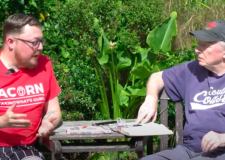The Montefiore Hospital: kidney stones

Stay healthy this summer as a poor diet & dehydration can result in kidney stones
Andrew Symes is a consultant urologist – a doctor specialising in problems relating to the urinary system. He is also the local expert on kidney stones, a common condition which is on the rise. According to the European Association of Urology, the number of cases has more than doubled in the last 30 years. The reason for this is our western diet; rich in salt, sugars and protein. In the UK it is thought that a stone will affect around one in eight men and one in 20 women at some point in their lifetime. Unfortunately once you have had a kidney stone, you have a 50 per cent chance of another in 10 years*.

The stones form when urine is concentrated from crystalline deposits of substances that the kidneys normally filter out of the blood. They look like bits of grit and can be smooth or spiky.
Kidney stones can be painless and are often picked up on scans for other reasons. However they sometimes give pain in the back, blood in the urine, or urine infections. When kidney stones move into the tubes that lead to the bladder (ureters) it is extremely painful, and most patients end up in casualty as an emergency case.
Small stones that are less than 4mm will usually pass naturally with painkillers and drugs to relax the tubes. This may take several weeks. If the stone does not pass naturally, especially if it is large (more than 4mm), then you will probably need to go into hospital for treatment. There are several options, depending on the size and location of the stone. One is extracorporeal shock wave lithotripsy (ESWL), which is performed while you are awake. It works by breaking the stone up using special sound waves (shock waves) so that the smaller pieces can be passed in your urine.
This treatment may not always be appropriate so you may need a procedure that requires a general anaesthetic. This is known as a ureteroscopy and involves passing a telescope into your tubes and destroying the stone with a laser.
You are more likely to get a stone if you don’t drink enough fluids. They can form quite quickly if you are dehydrated, which sometimes occurs in hot environments when you are sweating a lot, like the gym or on summer holidays! You should drink enough to keep your urine very pale – if it is dark yellow or brown, then you are dehydrated. Aim to drink between two and three litres a day. Drinking plain water is by far the best way to keep hydrated but citrus fruit drinks, such as lemonade, are also good.
The Montefiore Hospital in Hove offers treatment for most urological conditions, including kidney stones For further information, please call 01273 828120 or visit www.themontefiorehospital.co.uk
*Sources: NHS.co.uk; Patient.co.uk





















